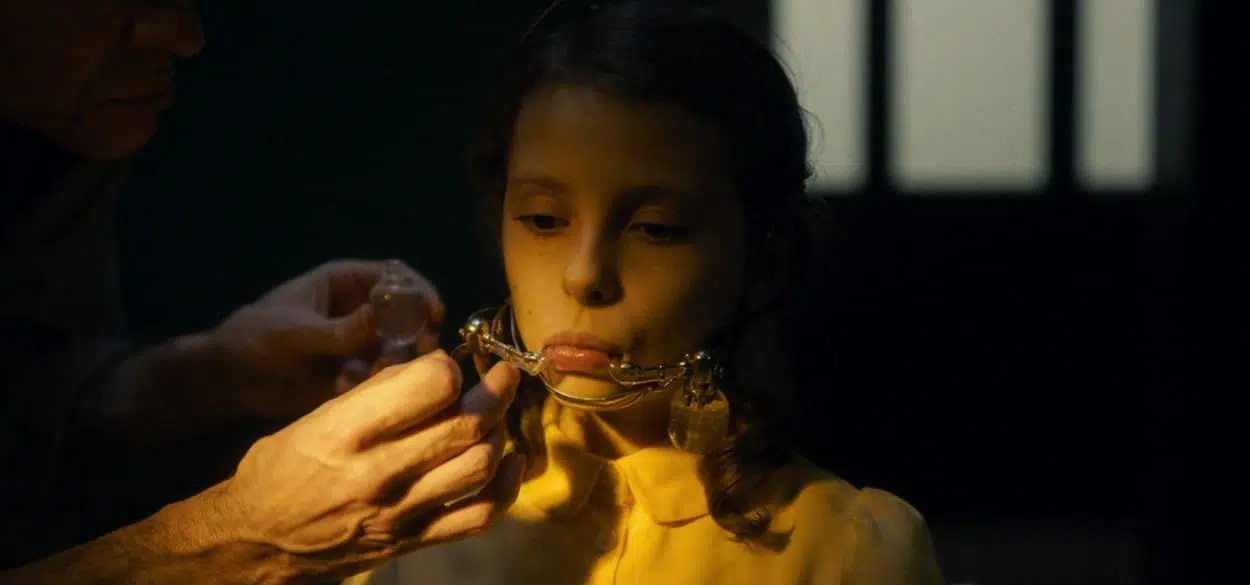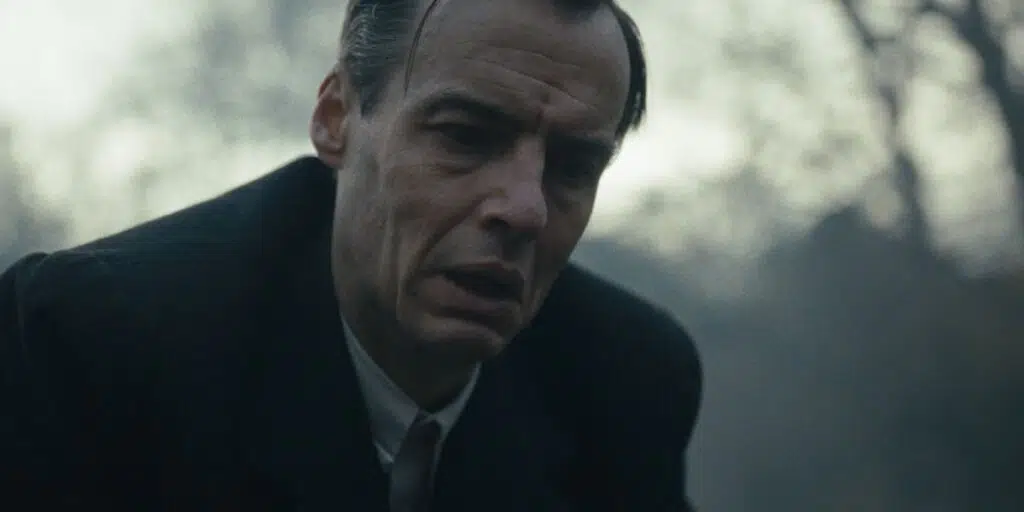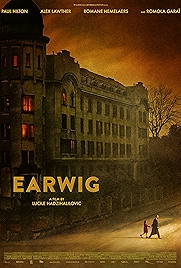A girl is having her saliva harvested in the opening scene of Earwig. There’s a contraption fitted to her head which consists of a metal frame, some ducting and a pair of little glass vials. An attentive man is is on hand to help collect the secretion, which is then transferred to a mould and frozen. Hey presto, a set of dentures made of frozen spit, which are then carefully fitted into the mouth of the girl, who has no teeth of her own.
Not a word has been spoken and in fact nothing will be said until, at 25 minutes in, after several repeats of the procedure (teeth made of ice…er… melt) in this big old house lit like a cave, the man receives a phone call and a mystery voice informs him that “there will be no further payments… You must prepare the girl to leave.”
Weird, but all pretty much par for the course for French film-maker Lucile Hadžihalilović, who scant four features in the last 25 years have all been spooky. All have featured a child being prepared in some arcane or unpleasant way for the adult world, by way of procedures that seem either unusual or cruel.
In Hadžihalilović’s 1996 debut, La Bouche de Jean-Pierre, a man sexually grooms his girlfriend’s daughter. In 2004’s Innocence the “education” takes place at a macabre boarding school for girls which they enter, symbolically, in a coffin. The focus switched to boys for 2015’s Évolution, and a forbidding hospital full of children who are being prepped for grisliness in a world noticeably devoid of young women or grown men.
Growing up can be difficult but in Hadžihalilović’s films it’s it’s freakily aberrant. Eventually ready for the outside world, the girl in Earwig, whose name is Mia (Romane Hemelaers), is dressed in a red coat for her trip to her new destination. Does this make the man, whose name is Albert (Paul Hilton), the big bad wolf? There are also suggestions she might have escaped from Nicolas Roeg’s Don’t Look Now.
Meanwhile, Hadžihalilović gets another story airborne, about an adult woman (Romola Garai) whose face is lacerated by Albert in a pub brawl. She winds up in hospital, where a nervous young man (Alex Lawther) spots someone ready to be a victim and sets out to make her his by turning her into a morphine addict. More careful grooming.
Relaying plot details doesn’t help to explain this film very much. Earwig is another film posing questions but not offering answers. Again, like Innocence and Évolution (La Bouche de Jean-Pierre is more of a pre-match warm-up, stylistically and thematically), it’s exquisitely beautiful to look at – sepulchral, womb-warm, languid – with a soundtrack to match, all ambient Eno-like washes and the haunting, evocative tones of the Ondes Martenot. Barely a word is spoken, but the sound design rises up to fill in the gaps. Every squeak and creak is heavy with significance.
If there was a fight going on at the birth of cinema between the formally reassuring Hollywood narrative style and the more formally disruptive work of people like Sergei Eisenstein, it’s obvious who won. One hides the joins, the other fetishises them. One aspires to realism, the other to the dream. Hadžihalilović sits firmly in that latter tradition, along with film-makers like David Lynch, Guy Maddin, Andrei Tarkovsky and Gaspar Noé.
Noé is also Hadžihalilović’s husband and she’s heavily involved in his work (and he in hers). So if you’ve loved something by Noé but never seen anything by Hadžihalilović, in a way you have – she co-wrote Enter the Void, produced Lux Aeterna and co-produced Vortex.
The other men in Hadžihalilović’s life are Franz Kafka – the “what’s going on and is someone guilty of something?” aspect. And Michel Foucault – all of her films can be traced conceptually back to his Discipline and Punish, a book obsessed with the modern humans’ obsession with categorising and correcting things.
It’s Hadžihalilović’s first English language film – the money from Film4 and the BFI may have ensured that – though there’s such a paucity of dialogue in it that it makes no real difference.
If this is your first Hadžihalilović rodeo and want to feel the full heat of her considerable talent, Innocence is the film to see. Put another way, there is a real sense with Earwig that the law of diminishing returns is beginning to apply.
Earwig – Watch it/buy it at Amazon
I am an Amazon affiliate


